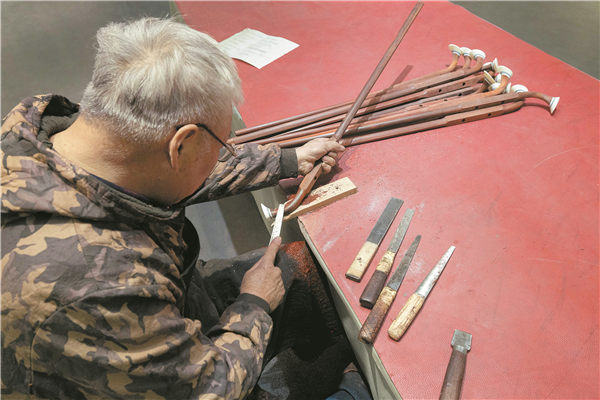

From craftsmanship and education to new venues and groups, the city is determined to play on its musical heritage, Cheng Yuezhu reports.
From downtown commercial areas to lakeside scenic zones, visitors to the city of Wuxi in Jiangsu province often encounter music as it plays a subtle yet indispensable role in enriching the overall experience.
Right beside the historical Chong'an Temple in the city center is the former residence of Abing (1893-1950), a famous blind musician known for his poignant classic erhu (two-stringed fiddle) composition The Moon Reflected in the Second Spring.
Walking along Dachengxiang pedestrian street, visitors are likely to pass by the Wuxi Opera Art Center, a compact museum that gives an account of the local art form through manuscripts, pictures and objects, and a theater space that hosts regular performances.
At the Lihu Lake Scenic Spot, a small island is being transformed into a music-themed "lake-center utopia". It is now home to a record store, a music bookstore, a rehearsal studio and an open-air performance space, becoming a destination where visitors can appreciate nature and music.
Wang Lina, director of the project, says that her company, Living Water Culture, has been hosting musical events since 2014, organizing more than 300 performances a year in Wuxi. The Living Water Music Festival recently won the 2024 best music festival brand award at the Hangzhou International Music Performance Industry Expo's awards ceremony.
According to Wang, the lake-center project is positioned as a hub for music lovers and musicians.
"The record store sells an international selection, and promotes music labels from Wuxi and around the country. Right beside it is a rehearsal and recording studio. We've collaborated with musicians and producers, Chinese and foreign, to encourage bands from around the country to record here and have their music mixed in Berlin," she says. "Further along is our music bookstore. We hope it'll become a popular spot that local youth enjoy visiting."
The project is one of many public venues Wuxi has been busy setting up, as it invests in cultural infrastructure, and enhances its reputation as a city of music.
Wuxi has had a celebrated history of folk music. The Meicun Erhu Industrial Park, which is located in a subdistrict of Xinwu, is known for making erhu in a way that merges craftsmanship and industrial production. Next door to it, the Meicun Erhu Cultural Park focuses more on promoting the instrument's heritage.
Huang Jianhong, chairman of the Meicun Erhu Industry Association, says that manufacturing began in the 1950s with two master craftsmen, Lu Linsheng and Wan Qixing, who created pioneering brands and laid the foundation for a thriving industry.
Since the 1990s, as more companies began to emerge, Meicun has gradually become known for producing mid- to high-end instruments.